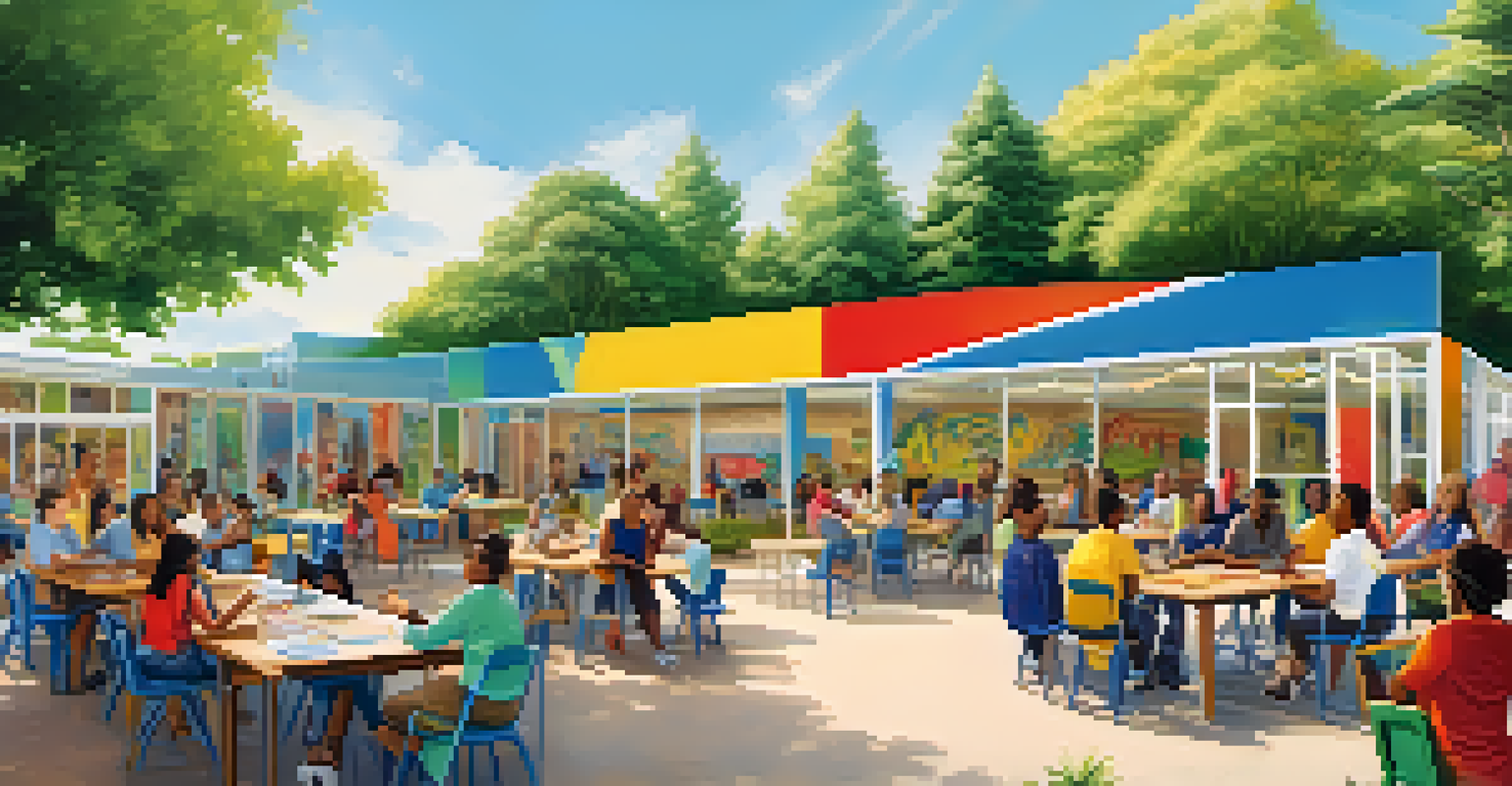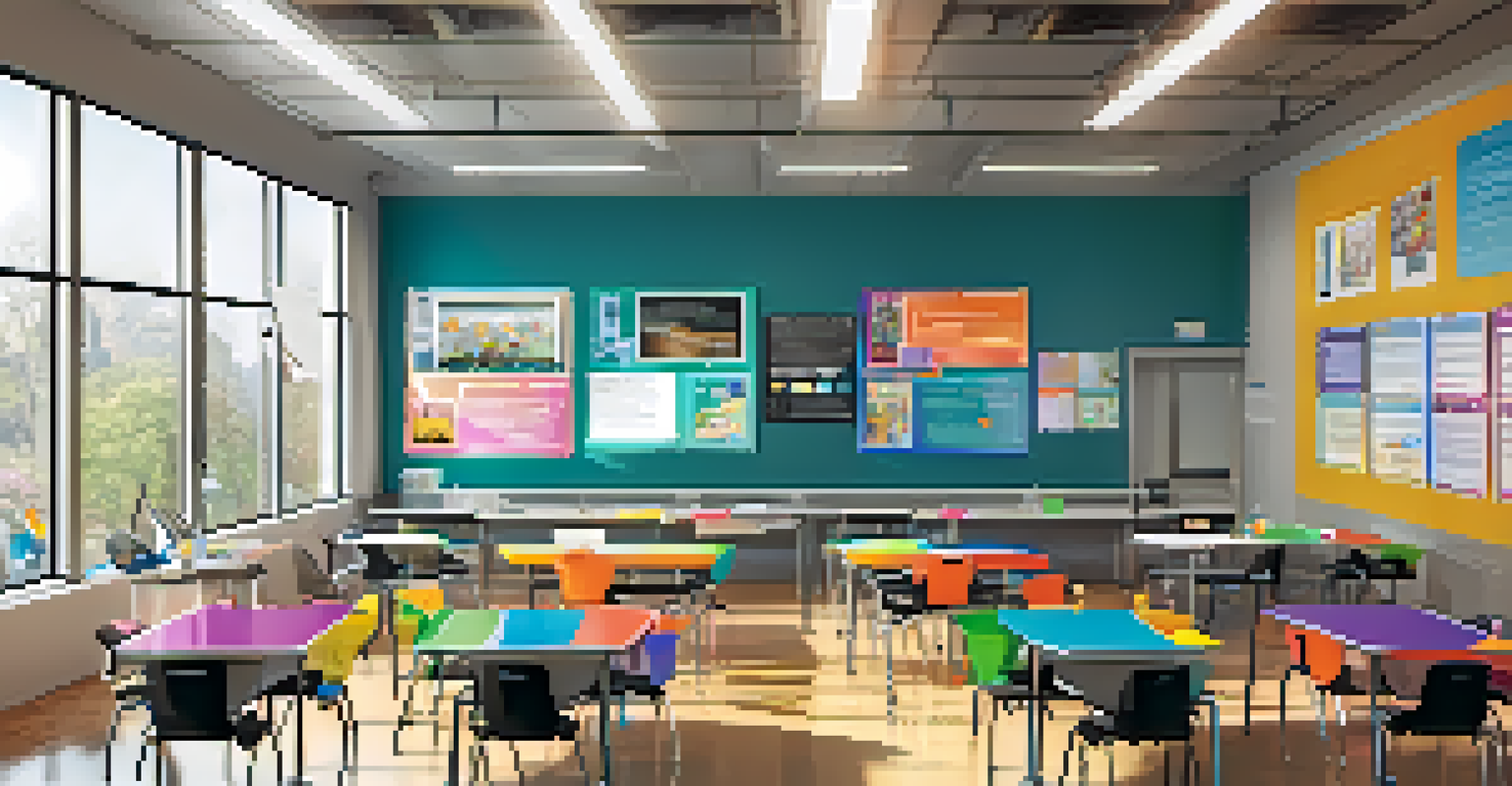The Importance of Lifelong Learning in Education Policy Reform

Understanding Lifelong Learning in Education
Lifelong learning refers to the ongoing, voluntary, and self-motivated pursuit of knowledge for personal or professional development. It's not just about formal education or training; it encompasses any learning that occurs throughout a person's life. This concept is crucial in today’s rapidly changing world, where new skills and knowledge are essential for success in many fields.
An investment in knowledge pays the best interest.
Incorporating lifelong learning into education can foster a culture of curiosity and adaptability among students. When learners see education as a continuous journey rather than a finite experience, they are more likely to seek out opportunities for growth. This shift in perspective can lead to more engaged and proactive learners who are better prepared for the challenges of the future.
Moreover, lifelong learning helps bridge the gap between formal education and real-world experiences. By encouraging individuals to seek knowledge beyond traditional classroom settings, we can create a more holistic approach to education that values diverse experiences and learning paths.
The Role of Lifelong Learning in Policy Reform
Education policy reform often focuses on improving curriculum and teaching methods, but lifelong learning should also be a central consideration. Policies that promote lifelong learning can help ensure that education systems remain relevant and responsive to the needs of society. This means creating frameworks that support both formal and informal learning opportunities.

For instance, integrating community-based programs and online resources into education policies can make learning more accessible. By doing so, governments can empower individuals to take charge of their learning journeys, fostering a sense of ownership and responsibility. This inclusive approach not only benefits individuals but also strengthens communities by enhancing local skills and knowledge.
Lifelong Learning: A Continuous Journey
Lifelong learning emphasizes the importance of ongoing education beyond formal schooling, fostering adaptability and curiosity.
Additionally, policies that prioritize lifelong learning can help address issues like unemployment and underemployment. By equipping individuals with the skills they need to adapt to changing job markets, education systems can play a key role in driving economic growth and social mobility.
Lifelong Learning and Skill Development
In today’s fast-paced world, the skills required for jobs are constantly evolving. Lifelong learning enables individuals to stay relevant by continuously updating their skill sets. This adaptability is not just beneficial for employees; it also enhances organizational productivity and innovation, as companies benefit from a workforce that is always learning.
Lifelong learning is no longer a luxury but a necessity for success.
For example, consider the tech industry, where new programming languages and tools emerge regularly. Professionals who commit to lifelong learning can quickly acquire these new skills, making them more valuable in the job market. This creates a win-win situation where both the individual and their employer can thrive in an ever-changing landscape.
Moreover, fostering a culture of lifelong learning encourages collaboration and knowledge sharing among peers. As individuals learn from one another, they contribute to a richer educational environment that promotes collective growth and problem-solving.
Incorporating Lifelong Learning into Curriculum
To effectively integrate lifelong learning into education, curricula must be designed with flexibility in mind. This means moving away from rigid structures and allowing students to explore their interests and passions. By providing options for personalized learning experiences, educators can help students see the value in continuous education.
Project-based learning is one approach that can effectively support lifelong learning. By engaging students in real-world projects, they not only acquire knowledge but also develop critical thinking and problem-solving skills. This hands-on experience is invaluable in preparing them for future challenges.
Policy Reform Supports Lifelong Learning
Education policies should incorporate lifelong learning to create inclusive frameworks that empower individuals and address societal needs.
Additionally, incorporating technology into the curriculum can facilitate lifelong learning. Online courses, webinars, and digital resources offer learners the chance to pursue knowledge at their own pace, making education accessible and relevant to a wider audience.
The Impact of Lifelong Learning on Equity
Lifelong learning also plays a significant role in promoting equity within education systems. By offering diverse learning opportunities, individuals from various backgrounds can access the resources they need to succeed. This is particularly important for marginalized groups who may face barriers to traditional education.
For instance, community learning centers and online platforms can provide valuable resources to those who do not have access to formal education. By breaking down these barriers, we can create a more inclusive educational landscape that values every learner's potential.
Furthermore, when education policies prioritize lifelong learning, they can help level the playing field. By equipping all individuals with the tools they need to continue learning, we can foster a society where everyone has the chance to thrive, regardless of their starting point.
Challenges to Implementing Lifelong Learning
Despite the clear benefits of lifelong learning, there are several challenges to its implementation within education policy. One major hurdle is the traditional view of education as a finite process, often leading to a lack of support for continuous learning initiatives. Changing this mindset requires a concerted effort from policymakers, educators, and communities alike.
Additionally, funding can be a significant obstacle. Lifelong learning programs often require investment in resources, training, and infrastructure. Without adequate funding, it can be difficult to create and sustain effective initiatives that promote continuous education.
Equity Through Diverse Learning Paths
Promoting lifelong learning can enhance equity in education by providing opportunities for marginalized groups to access valuable resources.
Lastly, there is the challenge of ensuring that lifelong learning opportunities are equitable and accessible to all. Policymakers must be intentional in designing programs that reach underserved populations, ensuring that everyone has the chance to engage in lifelong learning.
Looking Ahead: The Future of Lifelong Learning
As we look towards the future, the importance of lifelong learning in education policy reform cannot be overstated. With the rapid pace of technological advancements and societal changes, the need for adaptable and resilient learners has never been greater. Education systems must evolve to meet these challenges by embedding lifelong learning into their core principles.
This evolution will require collaboration among educators, policymakers, and communities. By working together, we can create an ecosystem that supports continuous learning and empowers individuals to take charge of their educational journeys. This collaborative effort will ultimately lead to a more informed, skilled, and adaptable society.

In conclusion, lifelong learning is not just a trend; it is a vital component of effective education policy reform. By prioritizing this concept, we can ensure that education systems remain relevant and responsive, equipping learners with the skills they need to thrive in an ever-changing world.